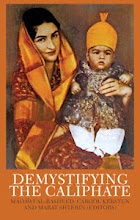Mark Juergensmeyer's article, published by the
Religion Dispatches website, carrying his first commentary on the death of
Osama bin Laden and its impact on the future of radical Islamism and Muslim political extremism reiterates the point he made in an
earlier essay on the impact of
Egypt's 25 February 2011 Revolt and other uprisings in the Middle East and North Africa: That the war on terrorism was not won by US special forces or high-tech intelligence operations, but tweeting youths in the Arab world and elsewhere. It confirms the underpinnings of the
Critical Muslims blog that -- in the long run -- the ideas of progressive, cosmopolitan and liberal-minded Muslims will outlast the nihilism of Islamist agendas. Here are a few excerpts corroborating this position:
 |
| Osama bin Laden 1957-2011 |
The imagined war of the Bush era may indeed be over. And the jihadi insurrection associated with bin Laden and his al Qaeda organization may also be dead. But I suspect that the real perpetrators of their deaths may not have been the elite American military cadre some hours ago in Pakistan, but the legion of cell-phone toting protestors earlier this year in Tahrir Square. They have helped to complete the erosion of legitimacy that has undermined the jihadi activists in recent years within the Muslim world.
What brought down the tyrants in Egypt and Tunisia, as it turned out, was about as far from jihad as one could imagine. It was a series of massive nonviolent movements of largely middle class and relatively young professionals who organized their protests through Facebook, Twitter, and other forms of electronic social networking.
The religiosity of Tahrir Square is far from the religion of radical jihad. Rather than separating Muslim from non-Muslim, and Sunni from Shi'a, the symbols that were raised on impromptu placards in Tahrir Square were emblems of interfaith cooperation; they showed the cross of Coptic Christians together with the crescent of Egypt's Muslims in a united religious front against autocracy.
Tahrir Square is a profound anti-jihadi lesson, and its significance has spread around the world. It has ignited similar nonviolent protests elsewhere in the Middle East, and it may also have altered the thinking of activists in other cultures as well. Intense discussion is underway in Palestine, where the Hamas-dominated strategy of strategic violence has been largely counterproductive; will a new nonviolent and non-extremist movement of young educated Palestinian professionals create a different kind of impetus for change in their region of the Middle East?
Read the entire essay by clicking
here.
 |
| Mark Juergensmeyer |
The above assessment echoes his earlier observations on the
Tahrir Square phenomenon in the
Huffington Post:
What brought down Mubarak, as it turned out, was about as far from jihad as one could imagine. It was a massive nonviolent movement of largely middle class and relatively young professionals who organized their mass protests through Facebook, Twitter, and other forms of electronic social networking. No doubt the passivity of the Egyptian military was also a critical factor; the army did not forcibly resist the protests, as the military has in Bahrain, Saudi Arabia, and Libya. Yet one cannot underestimate the importance of Tahrir Square, and similar protests in Alexandria and throughout Egypt. Clearly, they constituted the catalyst for change. The rallies at Tahrir Square often seemed more like rock concerts than like urban warfare, and when fighting did break out it was largely promulgated by thugs hired by the Mubarak regime rather than the anti-government protestors. Perhaps not since the peaceful overthrow of the Marcos regime in the Philippines has the world seen such a dramatic demonstration of the power of nonviolent resistance. The protests were not the weapons of jihad, nor were the voices of opposition the strident language of Islamist extremism.
 |
| Cairo's Tahrir Square, 25 February 2011 |
Here are his musings on Bin Laden's reaction to recent events in the Arab World -- not that these conjectures matter anymore:
Imagine what Osama bin Laden must have made of all of this as news trickled into the cave or cellar or whatever lair in which he is hiding. Imagine even more the puzzled chagrin of someone like bin Laden's primary lieutenant, Zawahiri, the Egyptian medical doctor who joined the most extreme Islamist jihadi movement years ago, convinced that only violent guerrilla warfare would topple someone like Mubarak. Tahrir Square clearly showed that Zawahiri was wrong.
However, he also added a cautionary caveat:
Does this mean that al Qaeda is finished, and the radical struggles of jihad will fizzle into history?Perhaps, in part. It is unlikely, however, that the al Qaeda organization, such as it is, will be abandoned. The small group of people who comprise the inner circle of the bin Laden organization will no doubt harden its resolve. Like the followers of millennarian movements who become more extreme and entrenched in their beliefs when the prophecized end of the world does not terminate on schedule, the true believers of al Qaeda will soldier on. (The whole essay can be found here).
In today's commentary he repeated that warning:
The rise of a new nonviolent popularism in the Middle East may seriously undercut the viability of the jihadi image of violent social change. On the other hand, a significant number of failures of nonviolent resistence may lead to a violent backlash once again.
Indeed, we are not there yet...Specialists in religiously inspired violence such as Juergensmeyer will have their work cut out for many years to come, but so will the analysts of the alternative discourses on the other side of the spectrum. 2011 may very well enter history as the watershed year for the amplification of those other voices.
For some of Juergensmeyer's books, click on the images below:















No comments:
Post a Comment